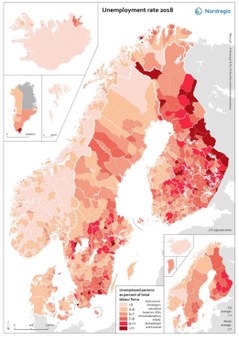Labour Market
Icelandic fisheries risk zero capelin catch for the second year in a row
Capelin has been one of the most valuable species for the Icelandic fisheries industry and general economy this past decade. Its importance has varied, but throughout this century capelin products have accounted for 17 per cent of fisheries exports and 8 per cent of the market value, making it an important part of the industry.
AFI research: The sick leave debate needs readjusting
Norway has one of the highest sick leave levels in the world. So far, no remedies have proven effective. The debate about sick leave and social exclusion sometimes needs a bit of guidance to stop it from going off track, says AFI researchers.
AFI and Arbeidsliv i Norden: A Nordic view of working life
The Norwegian Work Research Institute AFI turns 60 this year. For 24 of those years, the institute has published Arbeidsliv i Norden (the Nordic Labour Journal) on commission from the Nordic Council of Ministers.
Could fewer international students damage Norway’s international standing?
The number of international students in Norway is falling dramatically. Fewer Norwegian students are going abroad and fewer international students are arriving. A loss for Norway, argue educational experts.
Finland: Strong collaboration against work-related crime
The shadow economy and economic crime, illegal work and the exploitation of labour will be some of the priorities when Finland takes over the Presidency of the Nordic Council of Ministers in 2025.
Improved Nordic labour market statistics provide better insights
The Nordic Statistics Database, a collaboration between the Nordic Council of Ministers and the Swedish statistics and research company Statisticon, has undergone huge developments. This will benefit anyone working with comparative Nordic assessment statistics in working life.
Tight Nordic-Baltic cooperation against work-related crime
Work-related crime is a growing problem that requires cross-border collaboration between state authorities and countries. For several years, a Nordic-Baltic collaboration on work-related crime has been in place. In January 2025, it will be formalised on the initiative of the Nordic Council of Ministers.
Denmark cracks down on social dumping and money laundering
Danish authorities have introduced tighter legislation and lawsuits to stop cooperation between gangs and lawyers in cases of money laundering and social dumping.
Pro footballer: Takes more than playing ball
Santeri Väänänen (22) from Finland is a professional football player for Norwegian Rosenborg BK. Everyday life is pretty much the same regardless of which country you are playing in, he thinks.
Swedish hospital uses AI to the benefit of patients and staff
What are the challenges with AI and which are the good examples that can be replicated? Skåne University Hospital is already using AI to diagnose and treat cancer patients. We look at AI in Skåne from three angles, inspired by the new technology at Skåne University Hospital.
The Norwegian automated ferry that can be operated as easily as a lift
A wide range of new workplaces could become available in the wake of autonomous ferries.
Young Norwegians increasingly unhappy with working life
The 2024 Working Life Barometer shows more people are struggling financially, more fear losing their jobs or becoming ill and many young people are unhappy with working life.
The Nordic labour market turns 70 – but is it being fully explored?
Being able to work in a neighbouring Nordic country without applying for a work or residency permit is a given for Nordic citizens. But why do we no longer do it?
Hyllie – the district that symbolises the Nordic labour market
A private initiative became the beginning of a dynamic district halfway between Malmö Central and Copenhagen Airport. The Eurovision Song Contest was recently staged here and in June, participants this week gathered to celebrate 70 years of the common Nordic labour market.
Swedish minister: Still room for improvement to the common Nordic labour market
Sweden’s Minister for Employment Johan Pehrson has painted a picture of the Nordic region as a beacon in northern Europe, offering hope and opportunities to people. But what does the agreement on the common Nordic labour market really mean beyond what is already regulated by the EU?
Fresh report: Nordic citizens can work anywhere in the region. So why don’t they?
It would seem we are so comfortable in our home countries that we see few reasons to apply for work in or move to a different Nordic country.
National rules dominate the common Nordic labour market
A new Øresund agreement has been signed. But there are still challenges facing commuters who regularly cross a Nordic national border to get to work.
What does the common Nordic labour market mean to you?
The Nordic Labour Journal asked some of the participants at the conference marking 70 years of the common labour market what it means to them – personally or for their respective countries' labour markets.
Danielle - from Party Swede to seamstress
Like tens of thousands of other Swedish youths, Danielle Backström travelled to Norway to work. She became one of the “Party Swedes” who worked in restaurants, cafés and bars. Since then, she has worked as a home carer and with plants. Now, she is training to become a seamstress.
The story of the common Nordic labour market
The common Nordic labour market was established with little fanfare in 1954. Yet over time it has become one of the main pillars of the Nordic cooperation.
Document Actions



 Follow us on Facebook
Follow us on Facebook
